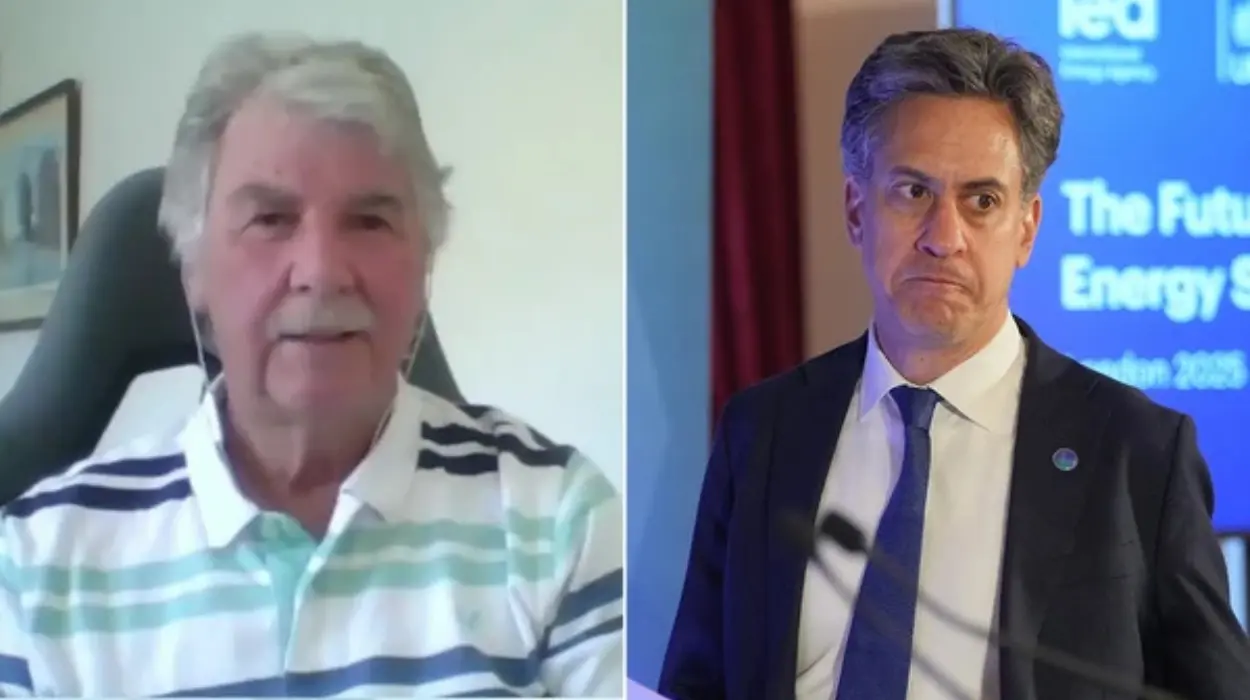UK (Parliament Politics Magazine) – Veteran weatherman John Kettley slammed Energy Secretary Ed Miliband’s £50m sun-dimming plan, calling it “disgusting” and a threat to natural systems.
As reported by GB News, John Kettley opposes Ed Miliband’s £50 million funding for solar dimming tests, warning it interferes with nature.
What did John Kettley say about Ed Miliband’s climate plan?
Mr Kettley labelled the move “disgusting” and “absolutely ridiculous”. He strongly rejected the notion of human-controlled weather systems, saying,
“I really do not think you should be playing God with the weather. It’s absolutely ridiculous.”
Mr Kettly called for an end to attempts at altering the weather, stressing the need to preserve natural patterns, insisting,
“Let it do what it is doing naturally and normally and has done for decades.”
He explained his position about weather patterns, adding,
“At the moment, we’re having a very dry spring. That’s got nothing to do with climate change and the rain will return and the colder weather will return as well.”
Mr Kettly reiterated that variations in seasons are expected, pointing out,
“We’ll have seasons ahead of us, not only this year, but in years to come.”
The weather expert explained that the timing of the seasons could change “by a week or two” naturally. He explained,
“We had that 40-degree [heatwave] for example just a few years ago. That’s been nowhere near challenged in the past two years, and it may not be challenged this year.”
Referring to Mr Miliband’s reported £50 million research pledge, Mr Kettley was clear, “I think that’s disgusting, quite honestly,” he stated.
He argued that this reflected broader issues with government decisions, adding,
“It’s not the only disgusting thing that this Government’s doing, is it?”
Mr Kettley made it clear he was prepared to challenge these initiatives,
“I’m not going into politics. I’m too late for that.”
He continued,
“I just cannot stand some of the things that are going on in the last six, eight, nine months, or whatever it is.”
The weatherman confirmed he would back official resistance to these projects, “I would sign any petition, I can tell you,” he asserted.
What did Tony Blair say about Ed Miliband net-zero policies?
Tony Blair, the former prime minister, warns Ed Miliband that his economic policies are misguided, as voters are aware their sacrifices will have little effect on climate change.
Sir Tony argued that voters
“feel they’re being asked to make financial sacrifices and changes in lifestyle when they know the impact of global emissions is minimal.”
How did Andrew Bowie criticize Keir Starmer’s net zero strategy?
Shadow energy secretary Andrew Bowie stated,
“It seems even Tony Blair has come to the realisation that Keir Starmer and the Labour Party’s mad dash to net zero by 2050 is simply not feasible, or sustainable.”
He said,
“As Ed Miliband’s net zero zealotry pushes this country’s energy security even further into the arms of China, and their slave labour supply chains, and risks driving up energy bills further and further, only Kemi Badenoch and the Conservatives are telling the truth about energy policy in this country.”
Mr Bowie added,
“Under new leadership, we have been clear that the cost of net zero by 2050 to families will be far too high, and we must urgently change course. Will Labour now finally be prepared to do the same, and put the national interest above their own ideological dogma?”
What did Ed Miliband’s spokesperson say about Sir Tony’s criticism of net zero policies?
According to a spokesperson for Mr Miliband Britain had already begun implementing Sir Tony’s suggestions by increasing investments in carbon capture initiatives and using artificial intelligence to enhance innovation in the sector.
A source added,
“We’ve just won an election in part on an argument that we need to speed up the clean energy transition. The PM said last week that clean energy is in the DNA of the government.”
What is Aria’s £56.8 million bid to tackle global warming?
The Advanced Research and Invention Agency, a government-funded body with £56.8 million in funding, plans to conduct
“small, controlled, geographically confined outdoor experiments on approaches that may one day scale to help reduce global temperatures.”

